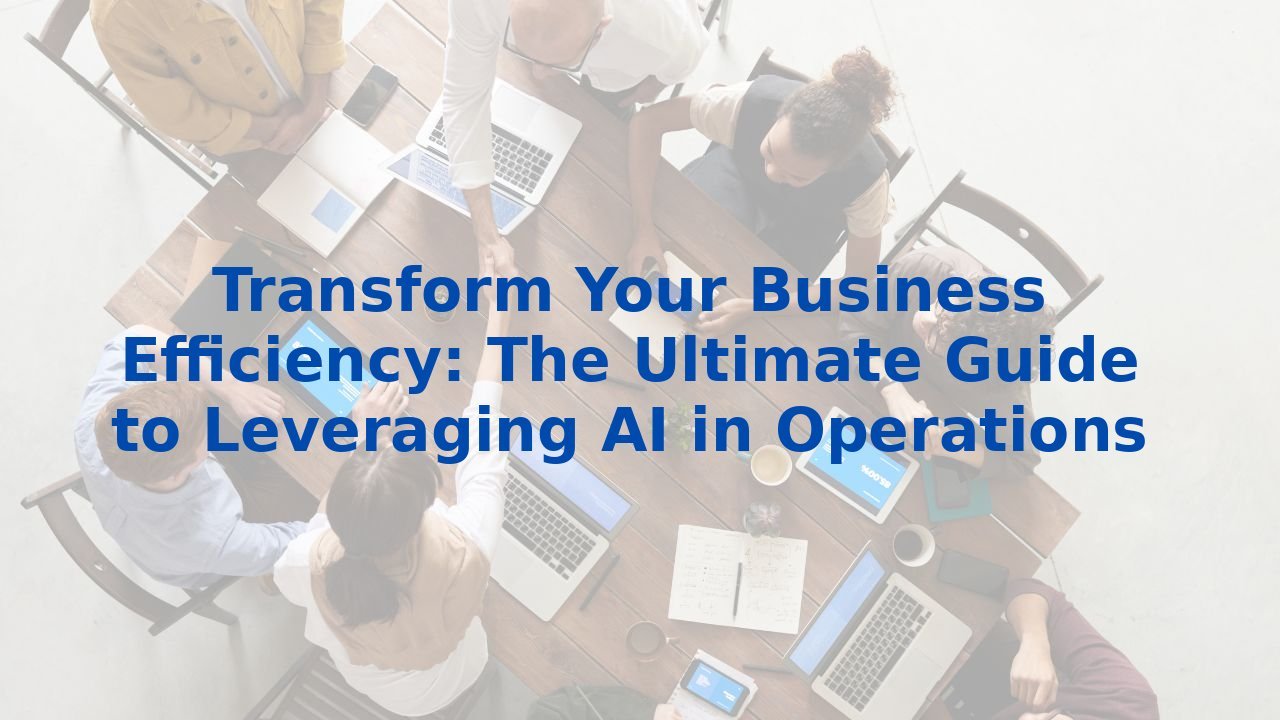Transform Your Business Efficiency: The Ultimate Guide to Leveraging AI in Operations
Transform Your Business Efficiency: The Ultimate Guide to Leveraging AI in Operations
In a world that spins faster each day, the relentless pursuit of operational efficiency is a non-negotiable for organizations aiming to thrive. Enter artificial intelligence (AI), the transformational powerhouse changing how we approach tasks, manage resources, and connect with customers. This guide will delve into the various business processes that AI can enhance and spotlight the remarkable efficiency improvements that come with its integration.
Automating Routine Tasks
Imagine a workplace where mundane tasks are seamlessly handled without the burden of human error. One of AI's most significant contributions to operational efficiency is its capability to automate routine tasks. From data entry to invoice processing and appointment scheduling, AI-powered bots and software free up your workforce, allowing human minds to focus on strategic, creative, and innovative endeavors. The result? Accelerated workflows and a marked reduction in error rates.
Optimizing Sales and Marketing
AI transcends mere automation; it can revolutionize sales and marketing strategies by leveraging data analytics to glean insights. In retail, for instance, AI can help organize inventory management and project customer demand with remarkable accuracy. By targeting advertisements based on comprehensive behavioral understanding, businesses can better connect with their audience, creating more effective marketing strategies and ultimately boosting conversion rates.
Enhancing Customer Experience
Today's customers have high expectations, seeking immediate and personalized solutions. AI-driven chatbots and virtual assistants have stepped up to meet these demands, providing 24/7 customer support. These smart tools analyze customer data and past interactions to offer tailored recommendations, fostering an environment of loyalty and satisfaction. When customers feel valued, businesses thrive.
Predictive Analytics and Decision Making
One of the most compelling advantages of AI lies in its predictive capabilities. By assessing historical data, AI can forecast demand patterns, streamline inventory management, and optimize production schedules. This proactive approach minimizes operational inefficiencies and ensures that resources are allocated effectively, reducing costs and enhancing data-driven decision-making. The agility fostered by these insights enables businesses to respond swiftly to market shifts.
Process Optimization
At the core of AI's transformative effects is its aptitude for process optimization. By diving deep into workflows, AI identifies bottlenecks and redundancies that inhibit productivity. It empowers organizations to restructure processes, automate manual tasks, and strategically reallocate resources. This leads to streamlined operations, reduced costs, and an overall boost in performance.
Quality Control and Assurance
Quality assurance is paramount across industries, and AI is enhancing this crucial aspect. By utilizing real-time monitoring technologies, AI can detect defects and irregularities in manufacturing processes before they escalate. This not only heightens product quality but also mitigates waste, further solidifying an organization’s reputation for excellence.
Risk Management and Supply Chain Optimization
In a volatile market landscape, proactive risk management is essential. AI lends itself to this through its analytical prowess, aiding businesses in identifying emerging trends and forecasting future scenarios. These capabilities foster resilience and agility within the enterprise. Additionally, AI enhances supply chain optimization by predicting demand fluctuations, fine-tuning inventory levels, and determining efficient shipping routes—ensuring a streamlined operation from start to finish.
The Benefits of Training Employees for AI
As AI takes on more tasks, it’s critical for your team to be poised and ready to collaborate effectively with these sophisticated systems. Investing in AI training not only equips employees with the skills to engage with automated tools but also empowers them to glean insights from data and make informed decisions. This enhancement of capabilities uplifts the entire organization, leading to higher talent retention and improved performance.
Conclusion
AI is not just a technology; it’s a movement that is reshaping how businesses operate. From automating mundane tasks to optimizing intricate processes and enhancing customer experiences, its potential is monumental. As organizations embark on this journey of transformation, understanding how to harness AI's power becomes essential. Moreover, facilitating AI training opens doors for a future where employees and intelligent systems work hand in hand, creating an environment of efficiency and innovation. In today’s digital landscape, the integration of AI is not merely advantageous; it is imperative for maintaining a competitive edge.
To explore comprehensive training programs designed for your organization, including resources on a variety of AI applications, visit the Complete AI Training Homepage.



